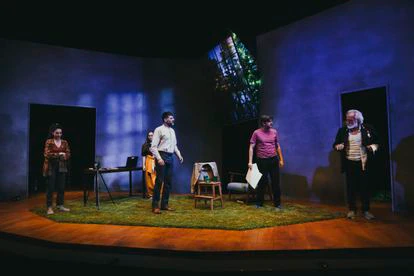All the conflicts of the human condition, all the personal, family or collective dramas appear in the living room of the house, in full view of everyone. Henrik Ibsen, the most famous and controversial Norwegian playwright of all time, wrote the wild duck in 1884, two decades after voluntarily going into exile in Rome.
The work is a profound study of the human condition, and is not exempt from the dust that Ibsen’s works have always raised due to his ability to condense in that imaginary domestic room the most corrosive social criticism, the drama within a family and a symbolism, that of the duck, with many readings and capable of structuring the drama and the action. “It is what we now consume massively in the series. All current fiction is based on Ibsen’s great discovery, which consisted of transferring all the forms and themes that constitute the identity of European theater to the living room of a house”, defends the theater director Carlos Aladro with ardor. This Tuesday he premieres at the Teatro de la Abadía in Madrid a new staging of this enigmatic and beautiful text, in Pablo Rosal’s version and with seven actors on stage: Juan Ceacero, Pilar Gómez, Nora Hernández, Ricardo Joven, Javier Lara , Jesus Noguero and Eva Rufo.
Aladro, former director of the Autumn Festival and the Alcalá de Henares Classics Festival, returns with this show to the Teatro de la Abadía, from which he was suddenly dismissed as artistic director last February and replaced by the playwright and academic Juan Mayorga. He doesn’t seem resentful, but he does seem hurt. “I feel fine. For me it is not a return, it took more than 20 years in and out of this theater and developing different roles ”he assures. “As artistic director, they did not give me time to carry out my project, pandemic in between, and before my contract ended, the board of trustees, which also underwent political changes, decided to dismiss me. I only have to respect the decision and keep to myself, for the time being, my own reflections on what happened”. Aladro also talks about the feeling of “liberation that comes from not going ahead with a task when it does not seem well received by the people who have entrusted it to you”.
The contradiction of the human being
At one point, Ibsen (Skien, Norway, 1828 – Christiania, Denmark, 1906) stopped talking about Vikings to look at the society in which he lived. Echoes of his personal life and experiences resonate throughout his work. Ibsen wrote that the wild duck addressed “the conflict between desire and competition, between will and ability, the overlapping of tragedy and comedy, whether on a general or individual level”, something he knew well from his status as an illegitimate son, of his bad relationship with his father or the family bankruptcy.
All the culture that goes with you awaits you here.
subscribe
Sitting in the quiet patio of strawberry trees in the Abbey after a rehearsal, Carlos Aladro and Pablo Rosal warn of the premonitory greatness of the author of texts as celebrated as Doll’s House, Hedda Gabler either the enemy of the people. “He is someone who already smelled all the insurmountable contradictions of the human being more than a hundred years ago and takes charge of them from the space of art. It is nothing different from what the Greek authors did, but in their case it is an industrialized, bourgeois, mercantile and atheist society, in which there is no longer spirituality or possible transcendence and everything is settled in the time of a lifetime. The protagonists of the wild duck they represent, in a way, the angel and the devil of Ibsen’s own personality. The referents of the family microcosm that he portrays in this work are those of the Ibsen family”, assures Aladro, a passionate and profound connoisseur of the Norwegian playwright, of whom he has already directed in Lisbon. The Builder of Solness in 2009. “the wild duck it is the most complex and unpleasant to assemble at first, because it seems problematic to understand. It is a pivotal work within Ibsen’s literature, which makes it fascinating and attractive”, adds Rosal.
For Ibsen, the theater was a sacred and transcendent space, an instrument to examine the human soul and, examining his own, he ends up offering a brilliant panorama of the collective and social soul. “From his personal wound it came to the social wound,” explains Aladro, while Rosal emphasizes the defeats she tells us about. the wild duck and, more particularly, of the “mediocrity of the middle class, of the lack of direction of a class without values and without religion”.
Although Ibsen already valued the public as a non-passive entity in the 19th century, in this version of the wild duck, staged in an indefinite space and time, the connection with the viewer becomes more direct, raising the category of Berta’s character. She unfolds to play the mistress of ceremonies and raises the philosophical and humanistic questions of the text, acting as a link for today’s society.
the wild duck
Where: Abbey Theatre. Calle Fernández de los Ríos, 42. 28015 Madrid.
When: From May 17 to June 19. From Tuesday to Saturday at 7:30 p.m. On Sundays at 7:00 p.m.
Price: Between 9 and 21 euros.

